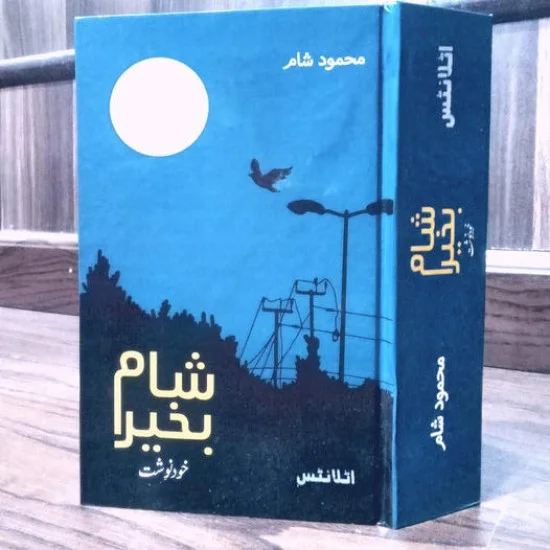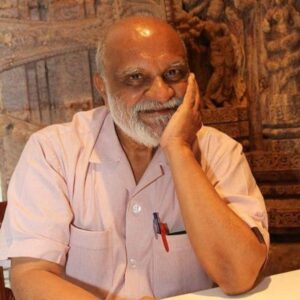
News Desk
Autobiographies of men of stature are not just descriptions of the events that took place in their lives but also of the era they lived in, along with an analysis of those events. And they also serve as documents that complement the history of that age.
Such is the autobiography of Mahmood Shaam, a veteran journalist and poet, with over 60 years of experience in the news media.
Titled Shaam Bakhair, this voluminous book of more than 800 pages tries to capture 80 years of Shaam’s life. It begins with him saying in the first few pages that he finds nothing beautiful in his childhood, which ‘normally’ is a joyous and beautiful time in one’s life. But that is understandable in his case, as his childhood witnessed severe trauma during the 1947 partition of the Subcontinent.
And as it is about the important events of the life of a journalist having such vast experience, the autobiography naturally contains information and facts that are important and not known by most people.
Shaam’s story begins with his migrating to Pakistan in 1947. He writes about sitting in the bogie of a freight train along with his mother, which had been forcibly halted. They heard shouts of a riotous mob from either side and soon there was blood everywhere. But there was also respite, he says, as it was a journey from slavery to freedom which, however, still remains a dream for him in this country, as we learn later in the book.
 Shaam Bakhair
Shaam Bakhair
By Mahmood Shaam
Atlantis Publications
ISBN: 978-696-601-512-3
860pp.
Shaam’s family arrived in Lahore and settled down in Jhang, a city where he received his school and college education, and which played a big part in shaping his personality and laying the foundations for his career as a writer and journalist. Gradually, despite difficult financial circumstances, he managed to get into Government College Lahore (Government College University now) and, during this time, he also got his first job, as a proof-reader.
As he was quite interested in reading and writing from the very beginning, Shaam started writing for Urdu magazines. And so gradually began his career in journalism, a journey from being a sub-editor at different newspapers to becoming a reporter and, finally, the editor of Jang, the largest and one of most influential Urdu news publications of the country.
During his career, he saw both highs and low, which he documents in some detail. He also remained connected with many influential personalities of the time. And being a journalist of such stature, Shaam also interviewed a number of prominent personalities from within Pakistan and abroad. He also travelled in multiple countries in all continents, which are detailed in the book and sometimes makes it read like a sort of a travelogue.
As for his analysis and opinions in the book, he makes us aware, from the very beginning, of how powerful people and the ‘establishment’ took hold of the country and its affairs. They did what suited them best and have been doing so ever since.
Shaam also talks about how religion was brought into the country’s politics, how it was misused and how all of that brought issues such as extremism, violence and polarisation in society. Furthermore, all of those issues were left unresolved, he says — the negative effects of which the Pakistani nation is still facing.
In a chapter on violence based on ethnic and linguistic issues, particularly in Sindh, he draws a disheartening conclusion as he writes: “After spending [77] years together, we [the people of Pakistan] are still very far away from each other. The distance is the same as it was in August 1947. It is a painful reality.”
As a journalist, Shaam also visited East Pakistan during its turbulent relationship with the western wing of the country, and has included in the book a chapter about it that is worth reading. It can be helpful especially for those who are interested in doing research on the events and happenings that led to the ‘fall of Dhaka.’ The events described by Shaam are his own personal observations.
Censoring newspapers and barring their sale in certain areas was a common practice during dictatorships in Pakistan and Shaam has written about how the media coped with such issues.
There are two sections on the Muttahida Qaumi Movement (MQM) and its leader Altaf Hussain’s rise and fall, in which he talks about the violence that took place in Karachi. Shaam’s opinion is that Karachi was deprived of competent leadership and made unstable just because of wrong policies and the carelessness of those in the corridors of power.
Shaam also questions, at different points, the legitimacy of the armed forces’ intervention in politics. He has quoted a speech by former president and prime minister Zulfikar Ali Bhutto that he delivered at Quaid-i-Azam Muhammad Ali Jinnah’s mausoleum on September 11, 1971. During the speech Mr Bhutto is quoted as saying: “Ae mere Quaid, bata ye jarnailon ki raat kab khatm hogi? Humaray Quaid, kya aap ne Pakistan is liye banaya tha ke ye jarnail hum par hukoomat kartay rahein? [O my leader, when will the night of these generals end? Did you create Pakistan so that these generals would keep ruling us?].”
Shaam’s own views are also pretty much the same. He writes, “The armed forces have become the strongest pillar of the state. The Constitution, judiciary, executive legislature and even the media collectively cannot equal the power of the army. It has become a state within a state.”
There is a chapter each on Zulfikar Ali Bhutto, former presidents Gen Yahya Khan and ‘Field Marshall’ Ayub Khan, the 1965 war and many other important events that occurred in Pakistan’s history. Being a poet, he also often uses poems and couplets to express his views and to lament over things.
It would be relevant to also say a word about the book’s style and diction. Although the language of the book is simple, it still feels like whatever Shaam has written could have been done best in fewer words, or by being more careful about the choice of words. The overall arrangement of events and chapters, too, could have been done in a better way; it appears somewhat arbitrary.
And last but foremost, despite the fact that Shaam criticises the corrupt practices of politicians, judges, the establishment and bureaucrats, and points out their faults, one gets a strong feeling that much has still been left unsaid. One expects more from a person like him, especially facts that could have revealed hidden matters. It cannot be that an extremely well-connected journalist like Shaam would not know more than what he pens down.
There should have been an effort by the writer to expose all those people whose actions have severely harmed democracy and hampered progress in this country and have pushed society to extremism, violence and poverty, among multiple other menaces.
Nevertheless, everyone understands, especially now, as to how difficult that can be for a writer in Pakistan. (Courtesy DAWN)





